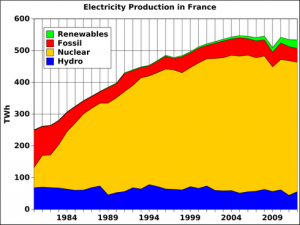Nuclear accidents2014 French nuclear accident more serious than official reports suggested
German media charges that the French nuclear authority and the French company operating the aging Fessenheim nuclear facility in France, concealed the seriousness of the April 2014 incident at the site. The French nuclear authorities withheld information not only from the German government, but also from the IAEA, to which they were required to submit a detailed report about the incident.

French power generation has dominated since the early 1980's, with most being exported // Source: wikipedia.org
German newspaper Süddeutsche Zeitung and public broadcaster WDR claim that both the French nuclear authority (ASN) and French energy giant EDF, which operates the two Fessenheim nuclear reactors, concealed the seriousness the 19 April 2014 incident at the site, when one of the reactors had to be shut down after water was beginning to leak from several places in the facility.
The nuclear incident at Fessenheim, located in Alsace near the border with Germany, may prove to be one of “most dramatic nuclear accidents ever in Western Europe,” researchers for SZ say. The researchers obtained a document which was sent by ASN to the then-head of the facility on 24 April 2014.
Yahoo News reports that the letter and subsequent reply show that the reactor could not be shut down in accordance with the routine procedure because the control rods were jammed. The reactor had to be shut down by adding boron to the pressure vessel, an unprecedented procedure in Western Europe, nuclear experts say.
“I don’t know of any reactor here in Western Europe that had to be shut down after an accident by adding boron,” Manfred Mertins, expert and government advisor on nuclear reactor safety, told WDR and SZ.
The media reports note that the official report on the incident, which ASN released weeks later, did not mention the adding of boron or the jammed control rods. The International Atomic Energy Agency (IAEA) requires that details of every nuclear incident be submitted to the agency, and ASN and EF submitted such a report – but it, too, failed to mention the boron and the jammed control rods.
The Fessenheim reactors, which went online in 1977 and 1978, are France’s oldest nuclear reactors. French politicians, energy experts, and neighboring Germany and Switzerland have been pressuring the French government to shut down the aging facility, and the government has said it would.
Yahoo News quotes Eveline Lemke, environment minister for the German state of Rhineland-Palatinate, which borders Alsace, who called for Fessenheim to be shut down immediately. She said she was “dismayed to hear about yet another incident involving a French reactor,” adding that France’s nuclear watchdog was “evidently failing.”
Germany is facing a similar problem with Belgium, where the aging Thiange nuclear reactor, located near the Belgium-Germany border, is reaching the end of its operational life. The reactor was shut down in March 2014, but went back online in December last year, in the face of mounting concerns over cracks in its containment vessels.
About three-quarters of France’s energy needs are met by nuclear power, but last summer the government passed legislation to reduce France’s dependence on nuclear energy.
